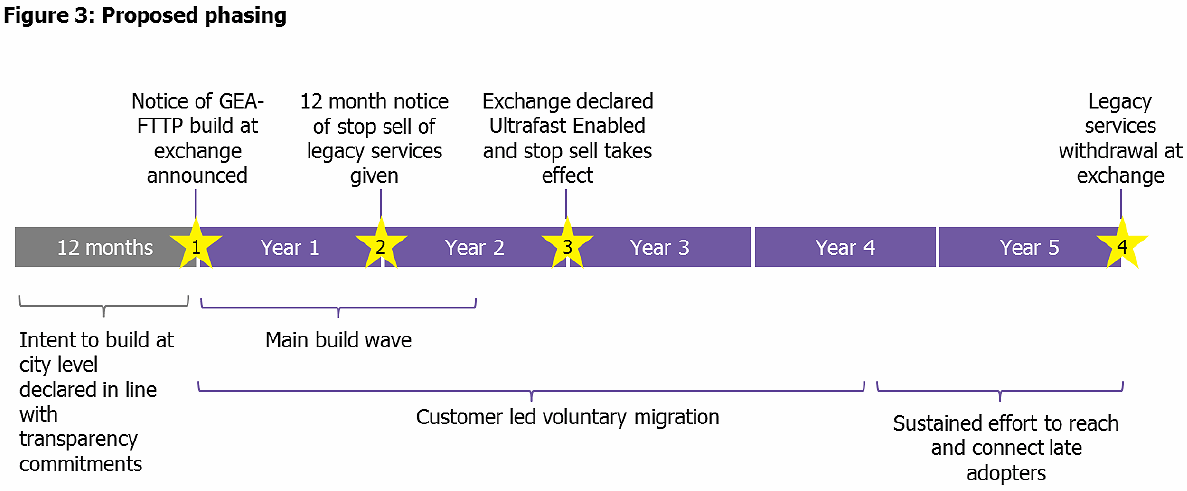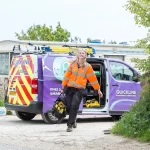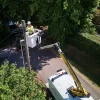BT to Propose Full Fibre Move and Copper Switch Off by 2027 UPDATE
Reports this morning claim that BT (Openreach) are in “secret” negotiations with the government and UK ISPs about a new six point plan, which could see the last of their old copper phone lines being switched off by 2027 and replaced by “full fibre” (FTTP) broadband. Provided everybody agrees of course.
The Sky News report is perhaps being a touch sensationalist in their language by describing the aforementioned talks as “secret,” not least since both Openreach (here) and Ofcom (here) have been running significant industry consultations on this very subject since March 2019. In fact many of the details highlighted in Sky’s report have already been covered in our previous summaries of those consultations.
The difference since then has of course been the change in political leadership, which initially saw the original full fibre for all target go from 2033 to 2025, although a recent reality-check by the new Government means that we now fully expect this to be watered down to “gigabit-capable” (i.e. enabling other Gigabit technologies, such as Virgin Media’s hybrid fibre coax network, to be included).
Advertisement
The culture secretary, Nicky Morgan MP, is due to meet ISP bosses (BT, Cityfibre, TalkTalk, Virgin Media, Sky Broadband etc.) today in order to discuss the plan and to hopefully find some agreement (crucial since removing copper is a massive industry undertaking and some unbundled ISPs have made a big investment in it).
We are also expecting Openreach to publish some more details, possibly today or tomorrow, on the outcome of their consultation and will update this article according.
A Spokesman for DCMS gave a recycled statement:
“We are investing over £650m in full fibre broadband until the end of 2021 and are committed to creating the right opportunities for investment as we speed up the roll-out of this technology.”
Just to be clear, the copper switch off plan is largely related to Openreach’s own network as nobody seriously expects Virgin Media to pull their coaxial copper cables out of the ground, not least since they’ll shortly be upgraded via DOCSIS 3.1 technology to deliver top speeds of 1Gbps (50Mbps upload) across their entire network by the end of 2021 (here). Elsewhere KCOM has finished their FTTP rollout and are thus well placed to be the first to cull copper.
Meanwhile the 2027 date talked about above could thus be taken by some as a reflection of how long it will now take before Openreach’s entire network is converted to 1Gbps+ capable Fibre-to-the-Premises (FTTP) technology, which is obviously three years past Boris’s originally proposed 2025 deadline.
Advertisement
However the 2027 date should be taken with a pinch of salt because they need to allow some time for customer migration between the old and new platforms, which would begin once an exchange area had been declared “ultrafast enabled” (i.e. once 75% of premises in that exchange are able to receive an “ultrafast” 100Mbps+ service via FTTP, G.fast etc.).
The consultations suggested a 3 year period for final migration, which if we go with 2027 would align to Boris’s 2025 date or it could mean 3 years after 2027 (2030). By comparison, under the old approach, this might not have been realistically achievable until a few years after 2033 (c.2036) and at the time even that seemed ambitious.

We should point out that Openreach are working to test the practicalities of all this as part of their new FTTP broadband Exchange Upgrade Trial in Salisbury (here). Some people will no doubt point out that encouraging customers to adopt FTTP could be difficult due to the higher cost, although the plan is to offer a 40Mbps (10Mbps upload) “anchor” service at a lower price (likely regulated pricing) to help tempt users off older ADSL2+ lines.
Advertisement
As ever there are currently a mass of complicated problems yet to be fully agreed and resolved. Key issues exist around funding (several billion will be needed to do the final 10-20%), wayleaves (still an obstruction in many areas), business rates (the current 5 year holiday on new fibre in England is far too short), the extra cost and confusion for consumers, getting access to existing buildings / MDUs (consultations on-going), finding enough skilled engineers, the need for softer regulation, competition (some ISPs still have big investments in copper and are building their own rival FTTP – might incentivise them to be more unhelpful than helpful etc.) and the possibility of related legal challenges.
On top of that we’d still view the timeline as being incredibly difficult to achieve, even with the softening of language from “full fibre” to “gigabit“. We are assuming from this that operators will still need to rollout full fibre or other Gigabit capable technologies to the final c.45% of unserved premises (Virgin already does most of the other c.50% in urban areas) and achieving that by 2025 or even 2027 would be an incredible feat.
Much will thus depend upon how flexible the Government is with their technology mix in the forthcoming National Infrastructure Strategy (NIS). Ofcom are then aiming to publish full details of their final industry-agreed approach in December 2019.
One other X factor (no, not Simon Cowell.. uggh) in all this is whether or not we’re about to be hit by another General Election and thus potentially another big change of policy at the last minute, which could change everything.. again. On the other hand it might be politically tedious for a different government to water down the 2025 date, without looking less ambitious.
We should also add that 2025 was the original date proposed for switching off the old analogue phone (PSTN) services and moving to all-IP (VoIP etc.) networks, which is not the same as completely switching off the old copper network; but that was before Boris’s target. Suffice to say there’s a lot of confusion about what is going to happen and when as the dates seem to now be aligned.
In any case the idea that copper could be completely switched off by 2027 still seems a touch fanciful.
UPDATE 9:27am
Cityfibre has warned about the perceived risk to focusing too much on Openreach as the fix for everything.
Greg Mesch, CEO of CityFibre, said:
“In light of our funded and mobilised Gigabit City programme to deploy wholesale full fibre infrastructure to at least five million homes, Ofcom’s exclusive focus on BT Openreach as the vehicle for migration from copper to fibre is wrong.
Retiring the copper network needs to be managed in a way that promotes competition, benefiting every builder of fibre networks, rather than simply reinforcing BT Openreach’s existing market dominance. Consumers should have the power to switch to any full fibre network.
CityFibre stands ready to play its part in transferring the nation’s homes and businesses onto a new generation of fibre networks.”
Mark is a professional technology writer, IT consultant and computer engineer from Dorset (England), he also founded ISPreview in 1999 and enjoys analysing the latest telecoms and broadband developments. Find me on X (Twitter), Mastodon, Facebook, BlueSky, Threads.net and Linkedin.
« UK Ranks 13th out of 34 Countries in New Connectivity Index
Broadband ISP TalkTalk Unveil Fairer Pricing Commitments »

















































Comments are closed